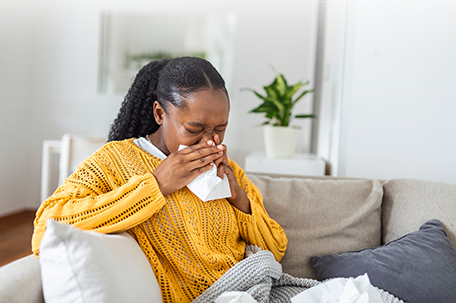
BPT
Do you suffer from itchy eyes, a runny nose or a scratchy throat during winter? Do you often find yourself coughing, sneezing, and having trouble breathing? Chances are you may have indoor allergies.
Allergens are not just found outside in trees or grass. The indoors can host many allergy triggers like mold related to water leaks, pet allergens, and dust mite and cockroach allergens.
Indoor allergies are a year-round problem, but you’ll notice them more during the winter because you spend more time at home. Also, because of the colder weather, you’re likely keeping doors and windows shut to keep the cold out. By doing that, you’re also sealing allergens indoors with you, and your heating system will recirculate the indoor air and any allergy triggers.
You don’t have to accept indoor allergies as an inevitable fact of the winter season. Using these five tips from the American College of Allergy, Asthma, and Immunology (ACAAI), you can be proactive and manage your winter allergies.
1. Clean regularly
It may seem like a simple solution, but cleaning house is one of the easiest ways to deal with indoor winter allergies. Dust, mold, pet dander and dust mite and cockroach droppings can hide anywhere and cause sneezing, coughing and congestion.
To limit your exposure to these indoor allergens, keep a regular cleaning schedule. Dust and vacuum frequently, especially under and behind furniture, where allergens can easily build up. Wipe down counters and other surfaces that you use often. During the holidays, wipe off holiday decorations, especially if you’ve stored them in areas where dust and mold proliferate.
2. Reduce pet allergy triggers
It can be difficult to balance your love for your pets and indoor allergy management. Just like you, your pets are spending more time indoors, increasing your exposure to pet dander and saliva.
While you may enjoy snuggling with your pets before bed, keeping them out of the bedroom will help with any allergies you experience at night that can disrupt your sleep. During the day, keep the door to your bedroom closed, so your furry family members aren’t tempted to go in.
When petting your cat or dog, make sure to wash your hands afterward, so you don’t accidentally touch your face and provoke an allergic reaction. Finally, remember to groom your pets regularly to reduce indoor air allergens.
3. Protect your bedding from dust mites
According to the ACAAI, dust mites live and multiply in warm, humid places and are often found in pillows, mattresses, carpeting and upholstered furniture. Even if your home is visibly clean, dust mite allergen particles are too small to be seen.
Use mite-proof zippered cases for your mattress and pillows to limit your exposure to dust mites. Every week, wash and change your sheets, blankets, and other bedding in hot water to eliminate any lingering dust mite droppings.
4. Find and prevent indoor mold
Did you know that there are roughly 1,000 species of mold in the U.S.? Many molds aren’t visible to the naked eye, and mold spores can cause allergic reactions when they become airborne. Because mold can grow in your basement, bathroom and under the sink, avoiding mold allergens can be difficult.
If you suspect you have indoor mold, it’s best to contact a professional who can find and clean up existing mold in your home. To prevent mold related to water leaks, quickly stop and clean up any standing water. Also, make sure to reduce moisture and humidity in bathrooms and kitchens. If humidity control is a problem, consider a dehumidifier.
5. Find an allergist
Consulting an allergist is the best way to identify and treat your winter indoor allergies.
“Allergists are the best trained medical professionals to treat allergies and asthma,” said Kathleen May, M.D., ACAAI president. “They can help you get tested, get treated and get better so you can enjoy the holiday season and beyond.”
After a consultation, your allergist may perform tests to diagnose your allergies and identify potential causes. An allergist can also prescribe a variety of treatments to give you relief from your allergic symptoms.
Using these five tips, you can better manage your indoor allergies this winter so you can enjoy the cozy colder months without suffering from allergies. To learn more about indoor allergies and find an allergist, visit: ACAAI.org/Locate-An-Allergist.
















Leave a Comment